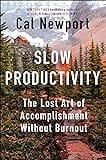Slow Productivity
Book Information
- Title: Slow Productivity: The Lost Art of Accomplishment Without Burnout
- Author: Cal Newport
- Genre: Self-Help / Productivity
- Publication Date: March 5, 2024
- Pages: 244
- ISBN: 9780593544853

Summary
"Slow Productivity" by Cal Newport presents a philosophy for organising knowledge work in a sustainable and meaningful way, focusing on doing fewer things, working at a natural pace, and obsessing over quality.
Key Ideas and Concepts
Main Ideas:
- The philosophy of Slow Productivity is built on three principles: do fewer things, work at a natural pace, and obsess over quality.
- Sustainable work methods can prevent burnout and improve overall work quality.
- Prioritising fewer projects allows for deeper focus and better results.
Quotes:
- "Those who suffer for others do more damage to humanity than those who enjoy themselves." (p. 34)
- "If you don’t prioritise your life, someone else will." (p. 76)
- "Obsessing over quality often demands that you slow down, as the focus required to get better is simply not compatible with busyness." (p. 102)
Personal Insights
Reflection:
"Slow Productivity" has encouraged me to adopt a more intentional approach to my work. By focusing on fewer tasks and allowing myself to work at a natural pace, I've found that the quality of my work has improved, and I feel less stressed.
Connections:
The ideas in this book align with those in Essentialism by Greg McKeown, particularly the emphasis on prioritising quality over quantity and reducing non-essential tasks.
Actionable Takeaways
Practical Applications:
- Implement a system to estimate the time required for new projects and schedule them accordingly.
- Focus on one major project per day to ensure deep work and high-quality results.
- Develop personalised rituals to support focused and meaningful work.
Goals:
- Create a schedule that includes sufficient time for important tasks without overloading myself.
- Establish rituals that help transition into focused work sessions.
- Continuously review and adjust my workload to maintain a natural pace and high quality.
Detailed Notes
Chapter-by-Chapter Summary:
- Chapter 1: The Philosophy of Slow Productivity
- Introduces the core principles of Slow Productivity: doing fewer things, working at a natural pace, and obsessing over quality.
- Key Concept: Sustainable and meaningful work methods prevent burnout and enhance quality.
- Chapter 2: Do Fewer Things
- Explains the importance of focusing on fewer tasks to achieve better results. Suggests estimating the time required for new projects and scheduling them realistically.
- Key Concept: Prioritise fewer projects to allow for deeper focus.
- Chapter 3: Work at a Natural Pace
- Discusses the benefits of working at a natural pace, allowing for variations in intensity and conducive settings for brilliance. Recommends doubling the initial time estimates for projects.
- Key Concept: Avoid rushing important work; let it unfold naturally.
- Chapter 4: Obsess Over Quality
- Emphasises the importance of quality in work. Suggests slowing down to focus on producing high-quality results, even if it means missing short-term opportunities.
- Key Concept: High-quality work requires slowing down and focusing deeply.
Analysis:
The idea that true excellence requires slowing down is a good reminder in a culture that often confuses busyness with productivity. Implementing this principle has significantly improved the standard of my work.
Additional Resources
Related Books and Articles:
- Essentialism by Greg McKeown
- “Deep Work” by Cal Newport
Author’s Other Works:
- Cal Newport’s works can be found on his website. He is a prolific writer and academic.
Final Thoughts
Overall Impression:
"Slow Productivity" offers a compelling argument for a more deliberate and thoughtful approach to work. By focusing on fewer tasks and emphasising quality, it provides a sustainable path to achieving meaningful and high-quality results.
Rating:
5/5 stars. This book provides practical and profound insights for improving productivity and well-being.

